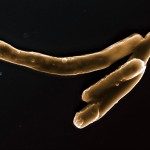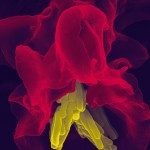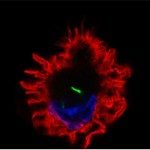Link to Pubmed [PMID] – 22233810
Proc. Natl. Acad. Sci. U.S.A. 2012 Jan;109(4):1204-9
Tuberculosis (TB) is a major public health problem. One-third of the world’s population is estimated to be infected with Mycobacterium tuberculosis (MTB), the etiological agent causing TB, and active disease kills nearly 2 million individuals worldwide every year. Several lines of evidence indicate that interindividual variation in susceptibility to TB has a heritable component, yet we still know little about the underlying genetic architecture. To address this, we performed a genome-wide mapping study of loci that are associated with functional variation in immune response to MTB. Specifically, we characterized transcript and protein expression levels and mapped expression quantitative trait loci (eQTL) in primary dendritic cells (DCs) from 65 individuals, before and after infection with MTB. We found 198 response eQTL, namely loci that were associated with variation in gene expression levels in either untreated or MTB-infected DCs, but not both. These response eQTL are associated with natural regulatory variation that likely affects (directly or indirectly) host interaction with MTB. Indeed, when we integrated our data with results from a genome-wide association study (GWAS) for pulmonary TB, we found that the response eQTL were more likely to be genetically associated with the disease. We thus identified a number of candidate loci, including the MAPK phosphatase DUSP14 in particular, that are promising susceptibility genes to pulmonary TB.


